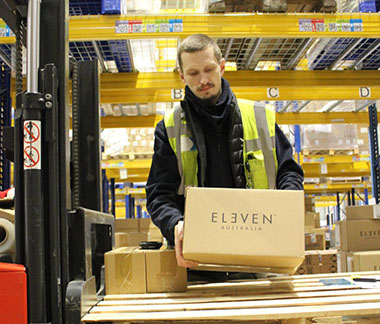Road haulage: mastering your choice of service provider
The Ministry of Ecological Transition recently reported that the total transport expenditure of French companies was €438.2 billion in 2019, 75% of which is dedicated to road transport. In the era of globalized trade, managing the transit of goods is a key element for companies. Road freighting is an essential part of this process and has a key role to play in the transport sector. However, freight road transport cannot be done without knowing how it works, but also the regulations in force.
Viaposte offers turnkey solutions in the three fields of expertise of logistics, industrial maintenance and transport. As experts, we help you make an informed choice for your road freighting.
Road freighting: what is it?
From a legal point of view, freighting is the subcontracting of a transport contract between the freighter and the shipper. Goods, known as freight, are entrusted to a third party who transports them from point A to point B and ensures that they are properly packed during the service. Although the freighting of goods is the responsibility of various sectors of activity such as maritime transport, transport by road is often preferred. This transport solution involves an intermediary who is invisible to customers, called a freight forwarder like Viaposte. Freighting is a particularly effective way of gaining speed while reducing the sometimes expensive cost of transport.
This method of managing freight traffic offers an immediate response to exponential transport demand such as peak volumes. In 2016, freight forwarding generated a staggering turnover of over €21 billion in France according to Transport et Logistique de France.
Regulations
In order to ensure that freight transport runs smoothly, the regulatory aspect should not be overlooked.
Freight forwarders, who are mandated to charter, must be aware of the law and ensure that they are entrusting the cargo to carriers who have several documents in their possession that must be readily available in their vehicles in the event of a roadside inspection:
- The carrier's documents such as a driver's license and a certificate of professional training;
- The vehicle's papers;
- The consignment note;
- Invoice for chartered goods;
- Safety protocol for loading and unloading of goods;
- Customs documents for international cargo.
The consignment note, known as the CMR, is the most important document for freight transport. It includes all the information associated with the goods such as:
- The date of issue of the consignment note,
- The name and address of the charterer;
- The date of the charter;
- The nature and quantity of the cargo;
- the weight of the goods;
- The name of the sender and the recipient;
- The address of the loading place;
- The address of the place of unloading of the goods.
The consignment note is also governed by Article L. 132-8 of the French Commercial Code.
How does a road transport take place?
The various stakeholders
Freight transport requires a specific organisation that is sometimes difficult to implement. To overcome these difficulties, various intermediaries and tools can be used.
Carriers or freight forwarders
Freight forwarders are the key players in road transport. They provide the link between the customer and the transport company commissioned to charter the goods. They mobilise their partnerships with other carriers. The freight forwarder, such as Viaposte, has all the necessary tools to ensure that the goods are transported properly. To do this, it works with a TMS (Transport Management System) to monitor the freighting in real time and produce management documents. Thus, the freight forwarder, as a freight professional, is free to choose the most appropriate mode of transport according to the customer's request. He has all the skills required to carry out the operations successfully. Find out more about Viaposte's skills here.
The Forwarder
In the case of multimodal freight transport, involving different modes of transport, a forwarder may be recruited. He coordinates the carriers between them and ensures that the transport plan is optimised.
Client Agents
The client agent is the principal. It is he who transmits the request for the transport of goods to the carrier in charge of delivering the load.
The freight exchange
The freight exchange is an online platform that connects shippers with carriers. The client agent has an overview of the various transport offers available on the market and can thus compare prices to boost his productivity. The two parties can exchange information directly on the platform to begin negotiations and discuss the logistics to be deployed according to the planned charter: quantity, type of goods or rater.
How to choose your freight forwarder?
The first thing to think about is the modalities. Will the charter have to involve a partial or full load? How many pallets will be transported? If the ecological aspect is important to you, you can also consider the fleet of vehicles deployed for the freighting of the goods. Gas-powered trucks (CNG), which reduce greenhouse gas emissions by up to 20%, are on the rise. Viaposte even inaugurated its first NGV station in early 2021 and is conducting a test of an electric truck.
Do not neglect customer satisfaction! To do this, you should find out in advance about the forwarder you wish to appoint. Finally, don't forget that road freighting requires guarantees. Remember to check the type of insurance offered.
The Viaposte solution
At Viaposte, our commitment can be summed up in one sentence: "We make it possible". Our multilingual team facilitates the routing of your goods from 1 to 33 pallets. We handle your requests, whatever they may be: urgent, one-off, exceptional, scheduled, regular. We take care of the smooth running of your road transport from A to Z throughout France and on European roads. You will find a tailor-made solution close to you thanks to our regional transport facilities. Viaposte guarantees a response in less than 2 hours for urgent requests.
We make it a point of honour to respect the schedules fixed upstream and the safety of your goods and guarantee permanent control thanks to our TMS tools. We integrate sustainable development concerns into our practices by using compressed natural gas (CNG) and liquefied natural gas (LNG) transport. Thanks to our TMS, we can track CO2 consumption per kilometre travelled.







